A PROVINCE AT BREAKING POINT
More than 300 Covid-related deaths and health staff shortages push Eastern Cape hospitals to the edge
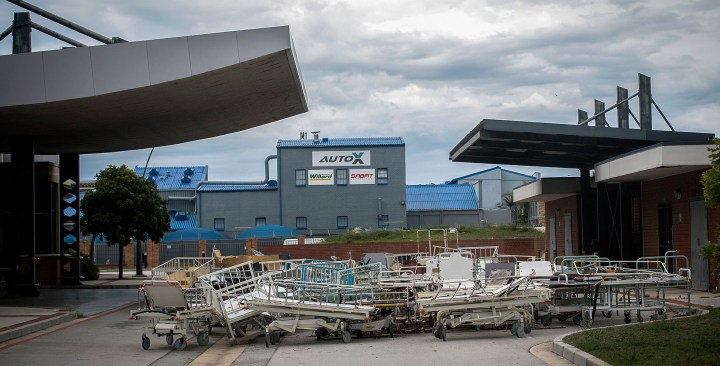
With mounting legal claims against the Eastern Cape Department of Health now totalling close to R40-billion, and R902-million paid out over the past financial year, calls to address dire staff shortages at specialist units in the province have not been heeded for the past three years. Over the next few days, Maverick Citizen will run a series of stories highlighting the conditions in the province’s public health facilities.
This story was done in partnership with Spotlight.
We are protecting the identities of doctors and nurses in our reports as the last time that they spoke out about staff shortages they were threatened with dismissal – but we have the documentation to back up what they claim is years of administrative abuse by the Eastern Cape Department of Health.
Over the next few days, we will also share what lies behind the devastating death toll in the province due to the two waves of the pandemic and the stories of the patients whose lives have been changed for the worse by a health system where good people are driven to breaking point.
***
With clinical departments in the Eastern Cape’s hospitals battling severe and dangerous staff shortages, doctors are doubling up as porters and general assistants, wards are closed and children die as access to intensive care units becomes impossible, surgeries are delayed for up to two years and dire calls for more appointments are met with a resounding silence.
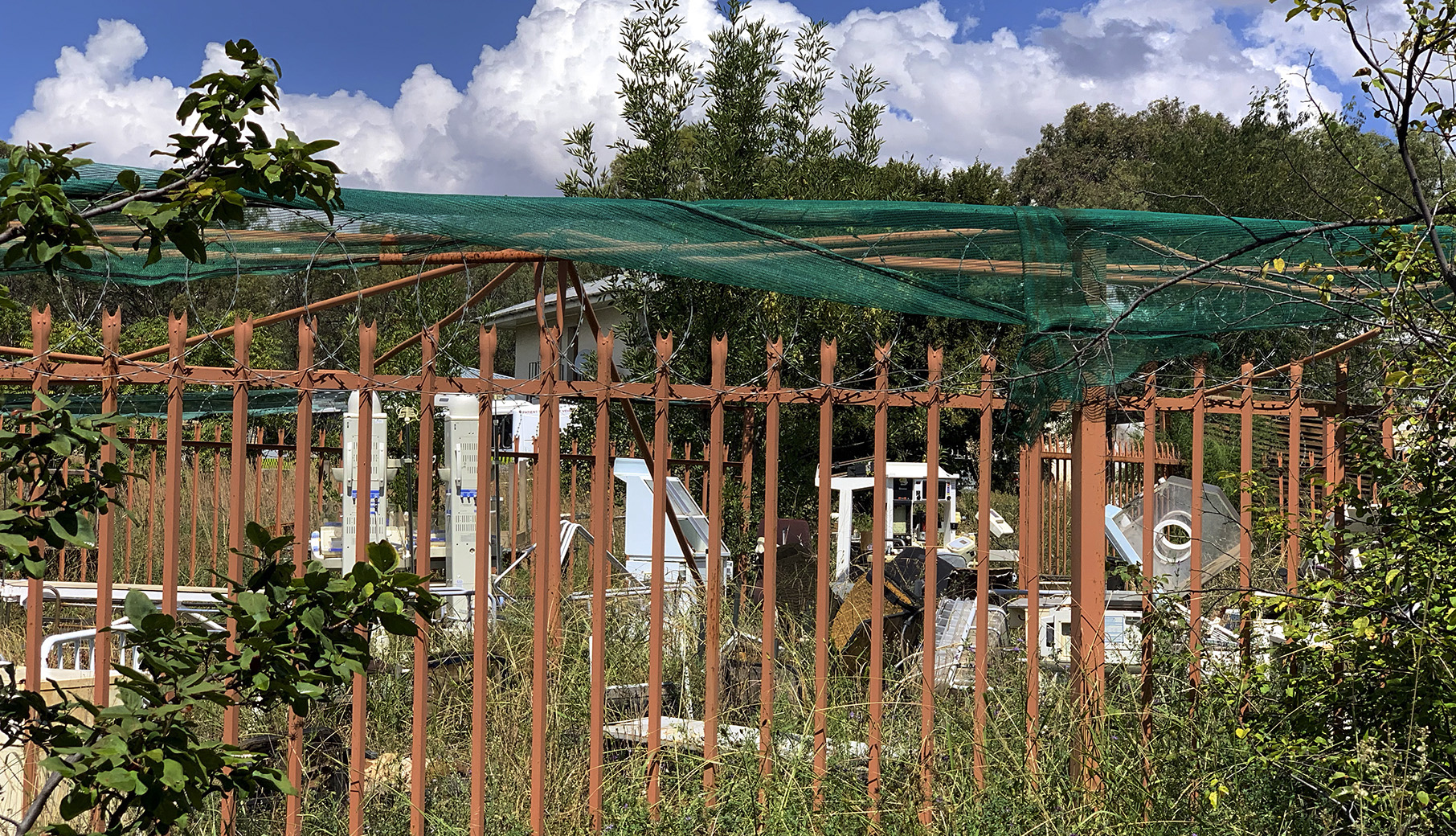
Old beds and equipment at the Aliwal North Hospital in the Joe Gqabi municipality. (Photo: Felix Dlangamandla)
The studies of students in their final year of medical school will also be interrupted now as specialists have declined to allow them access to the hospitals for their clinical rotations.
Desperate doctors at public hospitals in Gqeberha (formerly Port Elizabeth), fighting clinical and nursing vacancy rates as high as 60% in some departments, have, in an unprecedented move, declined to allow medical students to do their clinical rotation at the three hospitals in the city, saying they simply do not have the time to teach them.
“It was a painful decision to take,” one of the senior doctors said. “Training is one of the backbones of what we do. But we had no choice.”
It is a last and desperate move for some of the province’s elite specialists, some holding chairs at medical schools, who are battling extreme staff shortages in their units.
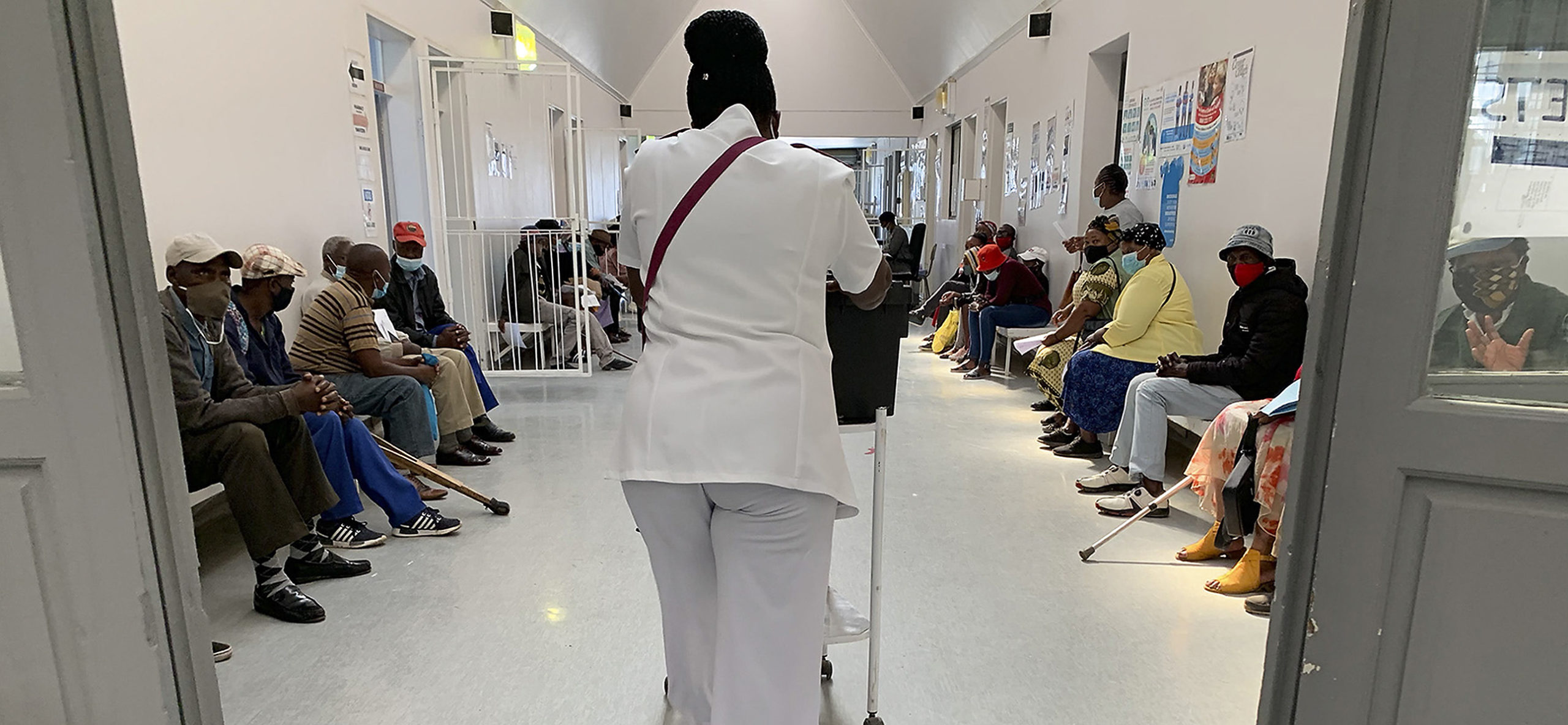
Patients in the waiting area of Empilisweni Hospital in the Joe Gqabi municipality. (Photo: Felix Dlangamandla)
Covid-19 has cut a path of destruction through the province’s hospitals, with 307 health workers dead and 11,978 infected, according to the Department of Health’s latest epidemiological report.
Eight thousand nurses and other temporary workers who have been helping in the hospitals with cleaning and nursing and who were being paid with “disaster funds” are facing the termination of their contracts at the end of March, but, even with their help, in some units doctors and nurses are doing dishes, cleaning, and wheeling patients to theatre.
“We have some of the most highly qualified and expensive porters in the world in this hospital,” one doctor said. “They all have MBChB degrees.”
The health department is adamant that the workers cannot be absorbed into the province’s public health system as there is no money to pay them. Last week Premier Oscar Mabuyane suggested that the nurses will be used to strengthen the province’s vaccination teams.
The after-effects of two deadly waves of the pandemic are, however, much more severe.
“Many of our nurses died of Covid-19. Many who fell seriously ill resigned and many who were close to retirement age resigned during Covid-19,” one doctor said. “They haven’t been replaced.”
“We have huge problems,” another added. “But this is a problem that has existed for years. It wasn’t just caused by Covid-19.”
In March 2020 while assessing healthcare facilities’ readiness to handle patients during the first wave of Covid-19 infections, the chairperson of the health committee in the Eastern Cape Legislature, Mxolisi Dimaza, highlighted the severe staff shortages at hospitals in the province.
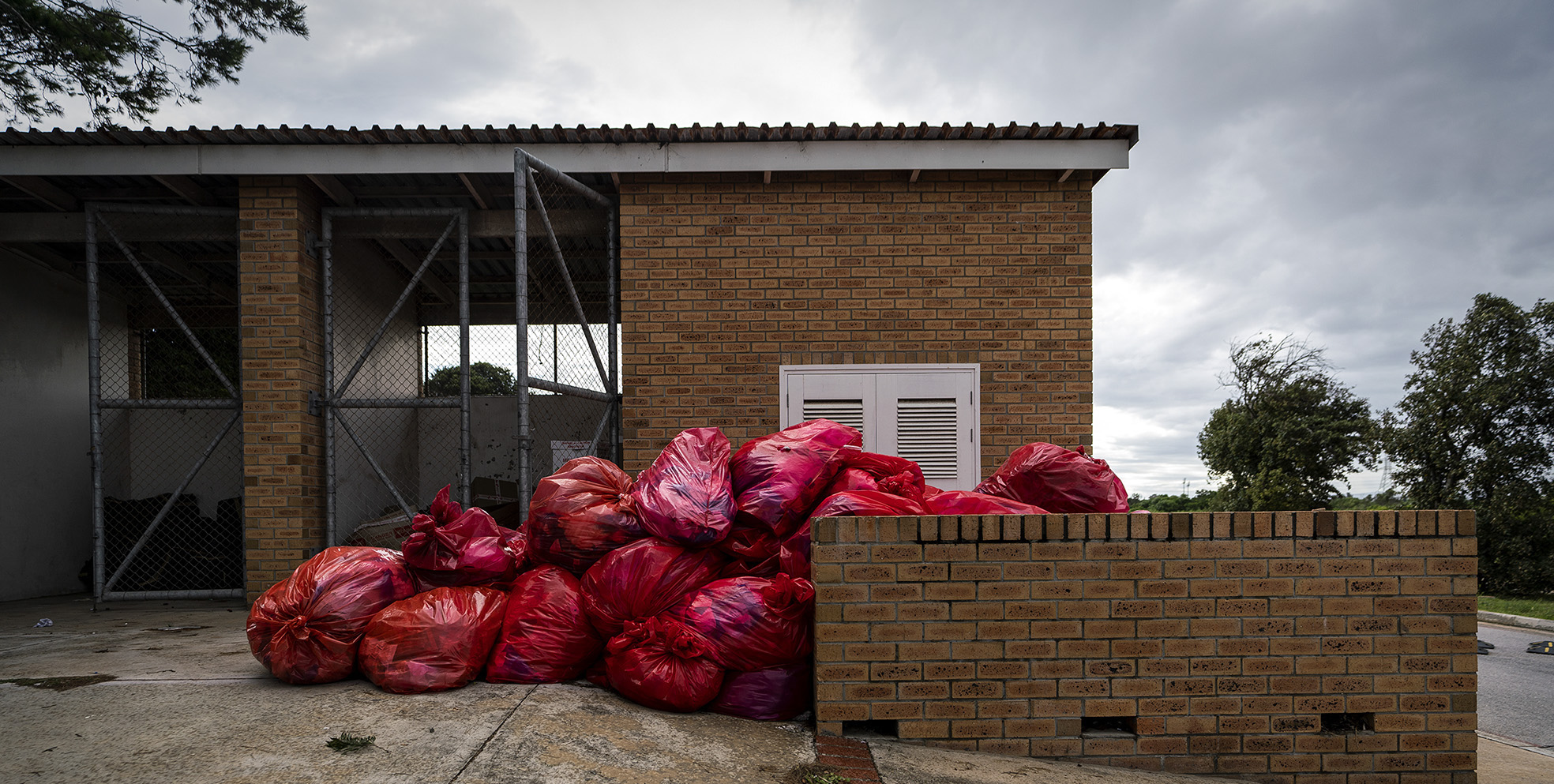
Bags of medical waste lie out in the open at Livingstone Hospital. (Photo: Shiraaz Mohamed)
A year later Uitenhage Provincial Hospital still does not have even one surgeon, at Livingstone Hospital the Department of Neurosurgery was left without a specialist when the doctor left after working for three years without a second-in-command, there is no ear, nose and throat specialist, and there are critical shortages in other departments. There are 13 vacancies in the department that formed the frontline in the metro’s Covid-19 response, including for seven specialists and five general practitioners.
“If you want a post filled,” one doctor said, “you need to interview. But if you want to appoint, the provincial cost containment committee must approve the appointment first. This can take several months. We never get reasons. If it takes too long and the post remains vacant into the next financial year, we lose it because then they will tell us it does not appear that we need it.
“I used to know someone who sat on that committee, but she left. At least back then I could phone and ask for help. Now I take hours to write a motivation and when I phone to hear what is going on they will say, ‘Write another one.’”
The Eastern Cape Department of Health currently has R4-billion in unpaid bills, a total of R40-billion in lawsuits against it and has already used 10% of the 2021/22 financial year’s money. In the past year, it had to pay R902-million in legal damages.
“They would make us fly to Bhisho,” one doctor said. “We will stay in a nice hotel and they will call us together to speak to one of their fancy lawyers. We will say we need more staff. He will say we must take better notes.”
Staffing at Dora Nginza Hospital, which is the centre for specialist paediatric services in the province, does not conform to the standard set by the National Committee on Morbidity and Mortality for Mothers and Babies. There is a shortage of 42 nurses in the paediatric unit and another 14 in the paediatric oncology unit, where children from the whole province are being treated.
The department has lost four paediatric specialists and super-specialists who have not been replaced, including two cardiologists and two paediatricians and six medical officers who resigned in the past 12 months.
“We have space for extra patients but we need nurses. Our doctors are traumatised and hurt. Nurses are applying for the jobs but they don’t get appointed,” a doctor said.

A few oxygen tanks in Empilisweni Hospital in the Joe Gqabi municipality. (Photo: Felix Dlangamandla)
According to official Department of Health documentation, one nurse is even working for free. Another, who has received highly specialised training and offered to work for free has still not received permission to do so.
Dora Nginza Hospital has a dire need for more intensive care unit beds and other specialist care beds.
“We have the space but we don’t have the nurses,” a doctor said. “If a sick child or an injured child can’t access the intensive care unit they die.”
The waiting list for paediatric patients to get cardiothoracic surgery is currently more than two years. Access for children to the catheterisation laboratory for non-invasive heart surgery has also been limited because of an extreme shortage of nurses and only one paediatric cardiologist left to do the work.
“We are not short of applicants,” another doctor said. “We are short of approval.”
“One of the main reasons for this is that our highly specialised anaesthetist has been banned from the hospital by the unions,” a source at the hospital said.
“The situation has the potential to cause huge medical claims against the hospital and what are we supposed to tell a judge: We couldn’t get a doctor into the hospital because the unions banned him?”
As a result, the death rate of babies and young children at the hospital has been increasing again. “We managed to almost half our death rate between 2016 and 2019, but now it is going up again,” one of the doctors said.
In other units, doctors and nurses are doing dishes and cleaning wards because of a shortage of general assistants. Apart from staff shortages, surgeons are struggling to get access to working equipment.
“I was in the theatre today and we couldn’t find surgical scissors that work. We have to wear the Covid-19 gowns because there are no others available and they don’t quite fit, so nurses have to cut open the sleeves, otherwise we can’t work. I don’t even want to think how this impacts on a sterile theatre,” a surgeon said.
At Dora Nginza Hospital the ultrasound machine was giving trouble and there was nobody to do an echocardiogram on newborns who could have heart problems.
Obstetricians receive a list of more than 20 “urgent” C-sections that must be done each day at Dora Nginza Hospital. The Obstetrics and Gynaecology Unit has four registered specialists, but two are currently away.

A patient walks down a passage at Dora Nginza Hospital. (Photo: Shiraaz Mohamed)
Patients are sleeping on the floor as two maternity wards cannot be opened because of a shortage of nursing staff.
“But we can never be full,” a doctor said. “The neonatal unit can take 75 babies. They currently have 110. What can we do? We can blame the monster that is the cost containment committee, but that doesn’t help either. We are now just on auto-pilot. If a third wave of Covid-19 hits this town we won’t cope.”
A doctor who left his job at Frere Hospital last year said only about a third of the specialist posts at that hospital had been filled. In some departments in that hospital there is only one specialist left.
“The hospital should lose its training accreditation,” the doctor said. “There are too few specialists left to supervise the trainees.”
At Gateway Clinic in Mthatha elderly and young people sleep outside the clinic premises to get help the next morning.
Mahlubandile Qhayiyana (72) and Belina Lunguza (88) were among the people queuing at Gateway Clinic on Monday morning. They urged the government to prioritise and make a plan for elderly people and those living with disabilities to avoid joining these long queues.
The SA Federation of Trade Unions Nelson Mandela Bay regional secretary, Mzikazi Nkata, said that at several primary healthcare facilities poor infrastructure and a shortage of staff was forcing personnel to do things like hand patients their medication through the fence. This had led to long queues.
“We understand over 300 frontline workers have lost their lives during Covid-19 and those workers are not replaced by the health system. This means healthcare workers are already facing all the ramifications that come with being understaffed.
“There are clinics that lost pharmacists and pharmacy assistants and we are asking ourselves who is distributing medication in those clinics. We want the department to absorb Covid-19 contract workers to all funded posts as we are still in the middle of a pandemic and there are already warning signs of a third wave.
“And if those contract workers are not being absorbed, it will cause a huge disaster for service delivery and astonishing numbers of Covid-19 fatalities in the Eastern Cape. All other provinces have renewed contracts and absorbed Covid-19 workers and we are asking ourselves, why is the Eastern Cape not doing the same?” Nkata said.
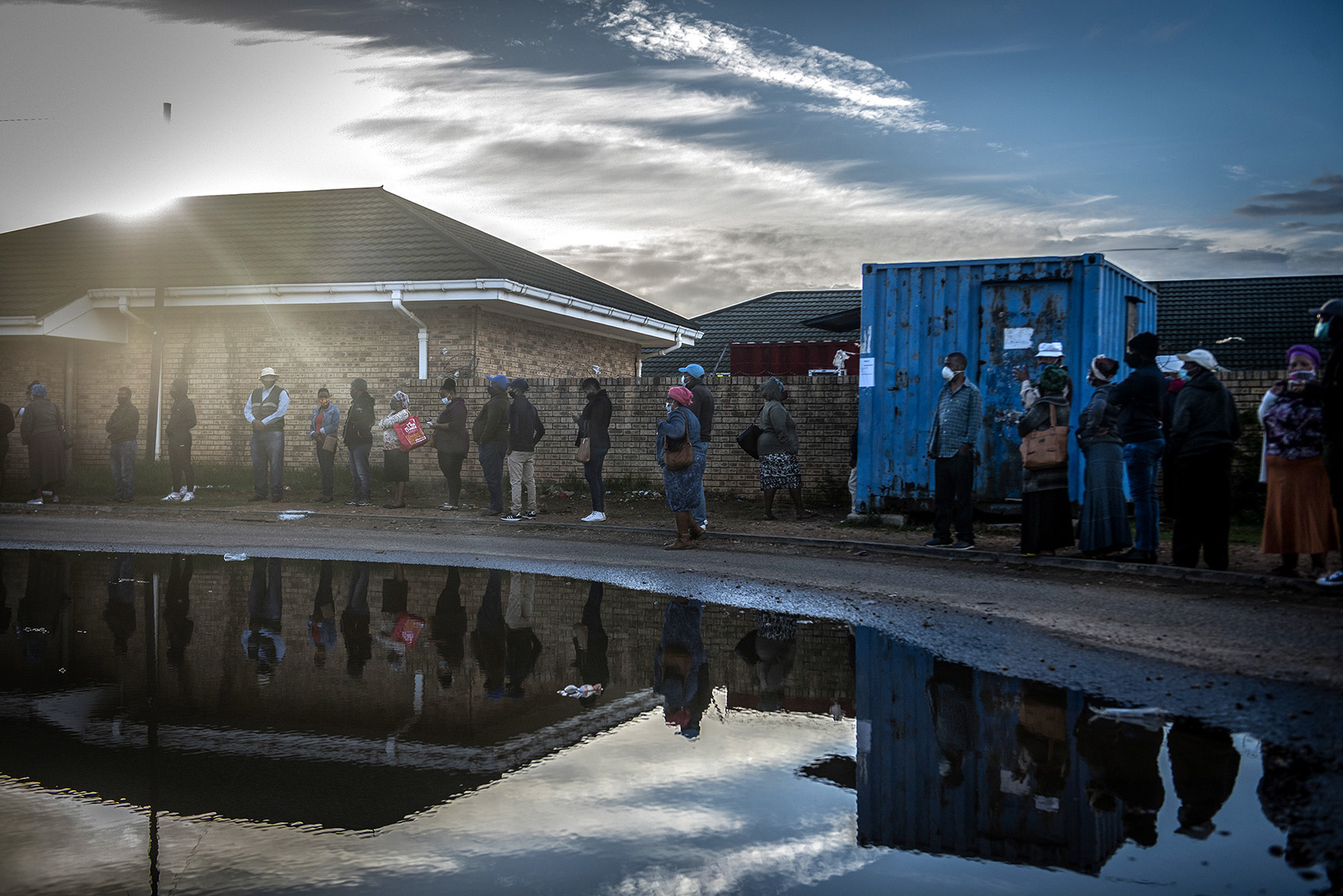
Long lines at a clinic in Motherwell despite bad weather. (Photo: Shiraaz Mohamed)
Joyce Mahambehlala (62) from NU 7 in Motherwell has been collecting her medication for chronic illness from the Motherwell community health centre for several years.
Mahambehlala said, “It is the survival of the fittest at this clinic and one has to wake up as early as 4am. In the good olden days we used to come to the clinic and then go to work, but now we can’t do that because our clinic takes a whole day to treat patients.
“Last week Friday I was turned back without being treated as the clinic had taken enough for the day. Nurses gave me an alternative date for Monday but I could not come on Monday because it was raining. There are no sheds outside of the clinic where we are made to queue before they open the gates at 7am.”
Eye patient Phindile Keli (78), who was referred from the Port Elizabeth Provincial Hospital said, “I was given a referral letter from [the] provincial hospital to collect my medication at Motherwell Community Health Centre. I arrived here early in the morning but the queue is not moving. They are supposed to open at 7am but it’s already 7.30am and no one is coming to inform us as to what is happening.
“Yes, this clinic is convenient compared with the provincial hospital, but it is always overcrowded.
“I’m now afraid that if I spend the whole day here I will collapse from hunger since I don’t have money to buy food or fruits. I have travelled on foot from NU 9 where I stay, which is a distance of more than 3km. The other challenge is that the road is dangerous with criminals who pounce on weak and vulnerable people like myself. In a nutshell, we are risking our lives by waking up early in the morning to come to the clinic.”
It is not only the urban clinics that are battling.
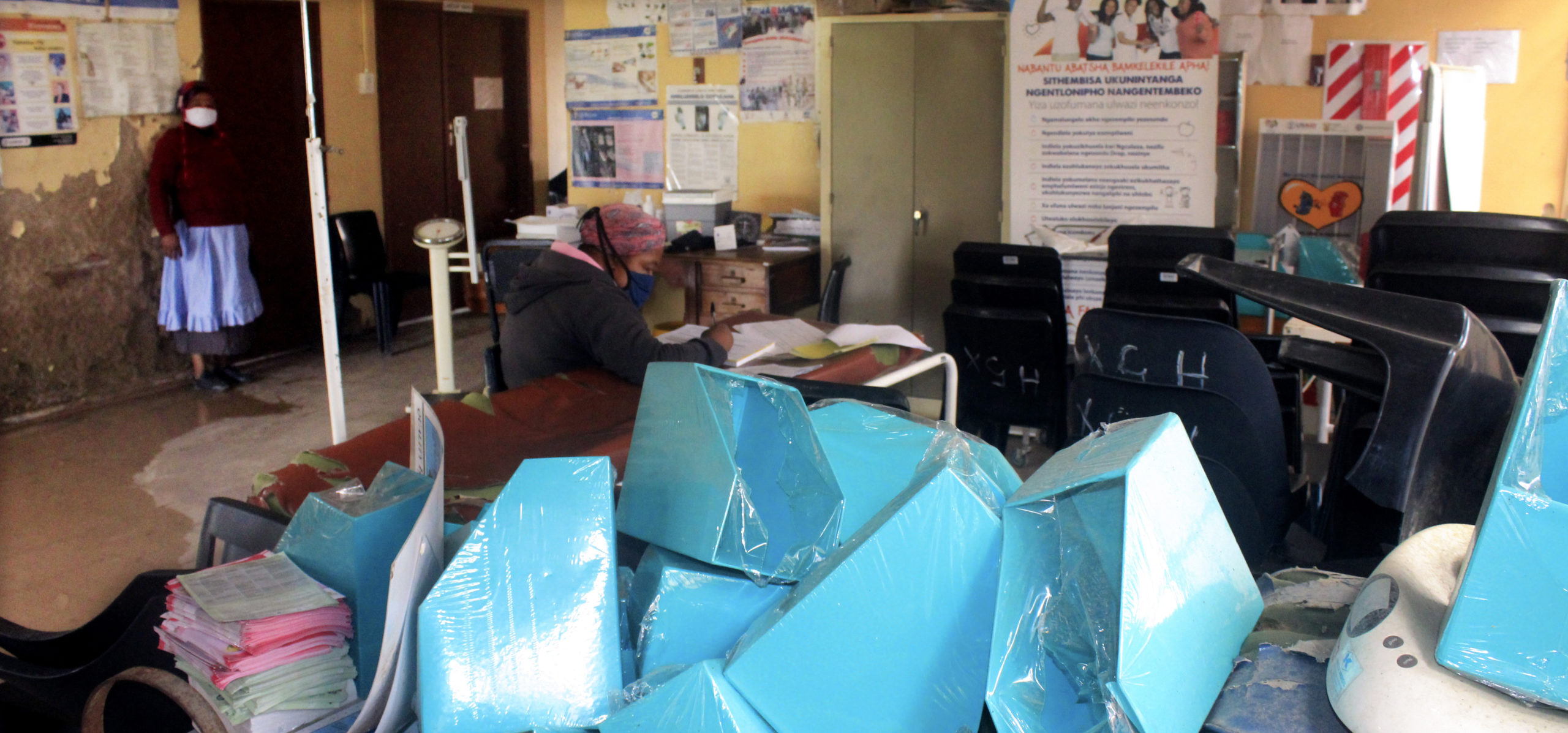
The waiting room at the Matubeni Clinic. The building lost part of its roof during a storm last year and it has never been replaced. When it rains, the clinic gets flooded. (Photo: Hoseya Jubase)
At the Matubeni Clinic in Ntabankulu, people fear for their lives because the clinic building is falling apart.
The roof was blown away by strong winds during a storm in December 2018 and has never been fixed. Matubeni Clinic committee chairperson Andile Ngconjana said the department was “undermining” those who live in deep rural areas.
“The health department has failed us and we are now approaching the Department of Public Works,” he said. “We are hoping that the newly appointed Health MEC, Nomakhosazana [Meth], will intervene because the previous MEC, Sindiswa Gomba, failed to solve this problem; she didn’t respond to our emails.”
The clinic also doesn’t have electricity.
Novumile Siganga, who was admitted last year with diabetes complications, said it was “ungodly”.
“I was sleeping in that bed, nurses were using cellphones to check the drip if is still working. This situation is stressful… there is no electricity.”
However, she said, she is grateful that she is still alive.
Health MEC Meth said they were reviewing staffing issues and would start at the “big head” of the head office.
“It is my desire to have every critical post in the department filled; however, we have to ensure that we get the right people into the right places.”
Asked about the role of the unions at the province’s hospitals, she said she was “talking to head office”.
“I am currently engaging with staff at head office and I go around the province meeting our stakeholders, including organised labour, so that we can have a conversation and that I understand their concerns.
“This week I am organising a virtual two-day strategy planning session and I have invited all stakeholders to be part of the session so that we can sit together, make one another to understand the challenges the department is facing.”
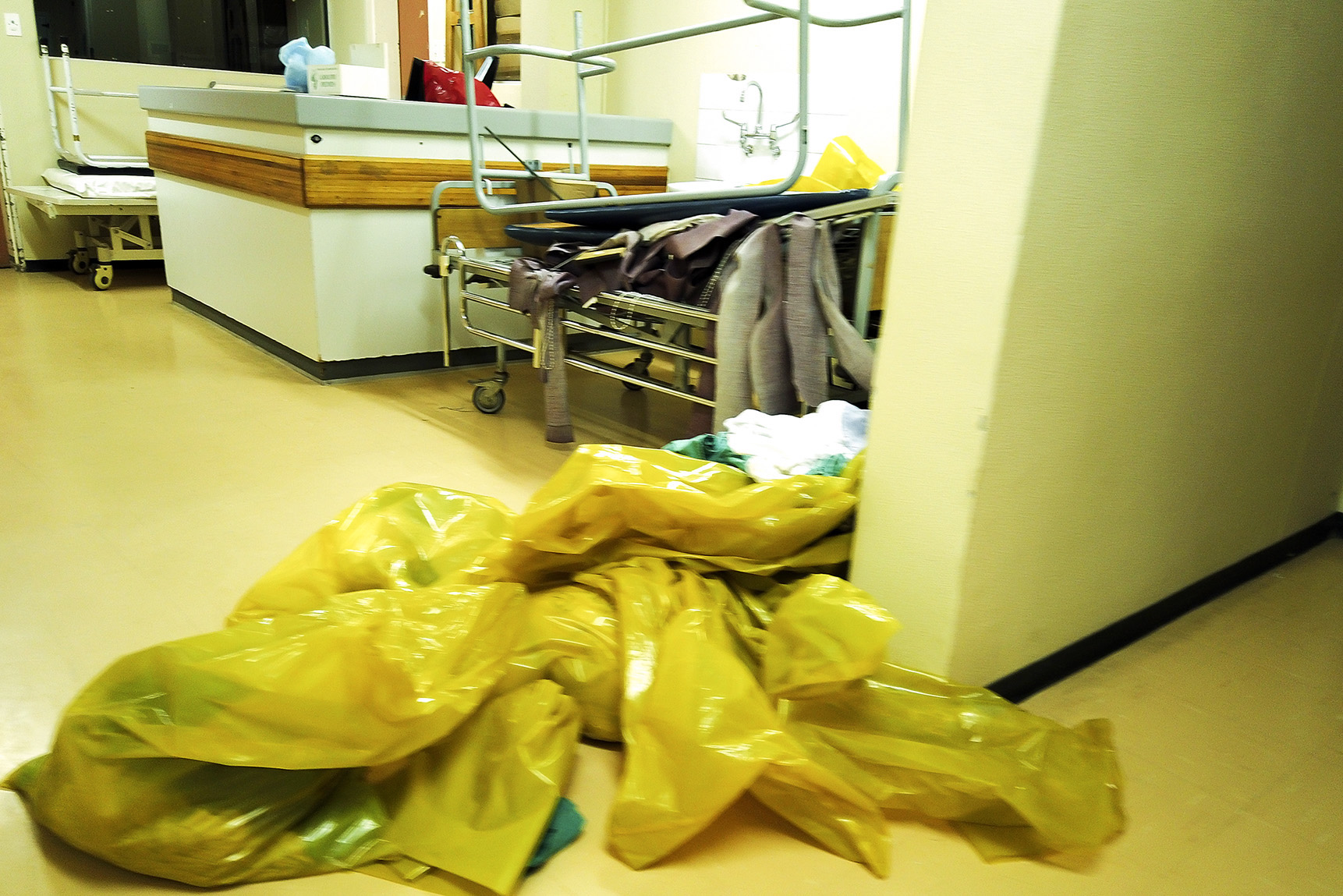
Bags of hospital linen discarded on the floor at Dora Nginza Hospital. (Photo: Shiraaz Mohamed)
With regard to the dire staff shortages at some of the province’s tertiary hospitals, she said “a lot” was being brought to her attention.
“The challenges faced by the department would need a collective effort. All hands are on deck to turn the situation around.”
She said she was studying a report written by the current acting head of the department, Dr Sibongile Zungu, about the state of healthcare facilities in the province during the first wave of Covid-19.
At the time, the report, which the Office of the Premier has refused to make public, led to the appointment of a task team to take over the province’s Covid-19 response.
“We are not shy to talk about any challenges confronting us in the department,” Meth added.
She said her top priority would be to migrate the department to an electronic record-keeping system to be in a better position to fight medico-legal claims.
Meth’s other priorities include addressing staffing issues, reducing long queues at health facilities, reskilling staff, promoting partnerships with the corporate sector, tertiary institutions and state parastatals, improving the cleanliness in facilities, ensuring drug availability at clinics and hospitals, and the “re-engineering of the department”.
“Managers must work and the department must provide tools of trade – where there is a failure, there should be consequence management, but equally I want to reward excellence. I plan to introduce service excellence awards.”
She said she will “most definitely” implement accountability and performance agreements for senior managers in the department.
While other provinces, including KwaZulu-Natal and Gauteng, extended the contracts of employees during the Covid-19 pandemic, the Eastern Cape Department of Health said it did not have the money to keep the 5,000 workers. DM/MC
Luvuyo Mehlwana was commissioned by Spotlight to work with Maverick Citizen. 
"Information pertaining to Covid-19, vaccines, how to control the spread of the virus and potential treatments is ever-changing. Under the South African Disaster Management Act Regulation 11(5)(c) it is prohibited to publish information through any medium with the intention to deceive people on government measures to address COVID-19. We are therefore disabling the comment section on this article in order to protect both the commenting member and ourselves from potential liability. Should you have additional information that you think we should know, please email [email protected]"



 Become an Insider
Become an Insider